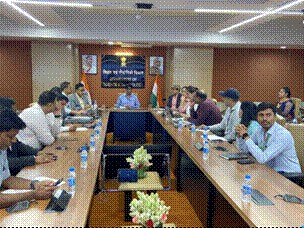Department of Science and Technology (DST) to drive quantum leap for Indian startups
Prof. Abhay Karandikar, Secretary, Department of Science and Technology (DST) today launched the first call for proposals for supporting startups in Quantum Technologies, under the National Quantum Mission following a new set of Guidelines to support and nurture startups.
The Department of Science and Technology (DST) has approved the comprehensive guidelines prepared by National Quantum Mission (NQM) to support and nurture startups in quantum technologies. These guidelines outline a clear roadmap for startups to access resources, funding, mentorship and infrastructure support. Along with the deep-tech startup policy will help India position itself in the quantum sector internationally. However, this is a new area that is evolving and as we learn we will finetune the policies and guidelines as per necessity,” said Professor Ajay K Sood, Principal Scientific Adviser to the Government of India.
Prof. Abhay Karandikar pointed out that the liberal guidelines would create a strong ecosystem of quantum technology startups. “Young and middle level startups could gain a lot from the call involving one of the most important deep tech areas and contribute in India’s journey towards becoming a global leader in it. Funding mechanisms and equity structures are being worked out so that the results of the Mission could be counted on an early as possible,” he added.
The guidelines elaborate upon the eligibility and selection criteria, evaluation process, funding mechanism, and other aspects like progress monitoring and access to facilities. By providing targeted support to these innovative start-ups, the aim is to create an ecosystem where innovation can flourish, creating new job opportunities and stimulating economic growth. Given the nascent stage of quantum technology in India, there is a need for robust support to bridge the gap between research and commercialization. The new guidelines provide a structured framework to address this challenge and support startups that require a substantial size of funding and institutional framework. “India’s startup community was taking the Quamtum Mission very seriously and these guidelines would help them bring about the desired transformation,” said Shri Ajai Chowdhry, the Chairman of the Mission Governing Board. Currently the program is being implemented by I-Hub Quantum Technology Foundation (QTF), the Technology Innovation Hub (TIH) at IISER Pune, established under the National Mission on Interdisciplinary Cyber Physical Systems (NM-ICPS), which is inviting the proposals to promote the quantum startups. Later it would be taken up by the Hubs to be established under the Quantum Mission. This proactive approach highlights the government’s vision to nurturing a dynamic quantum startup ecosystem in India. The program offers a clear path for startups to access essential resources and overcome the challenges inherent in this significant field. Startups interested in participating are encouraged to review the detailed guidelines and submit proposals to I-Hub QTF at IISER Pune before the deadline, August 31, 2024. Prof. Sunil S. Bhagwat, Director, IISER Pune; Shri. Srikant Sastri, Chairman, Geospatial Data Promotion & Development Committee (GDPDC); Dr. Ekta Kapoor, Head FFT Division, DST; Dr. JBV Reddy Mission Director, NQM, Dr. Swat Rawal Dang, NQM, Dr. D V Phani Kumar, NQM and several quantum professionals attended the event.

